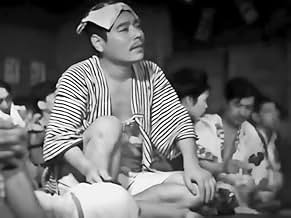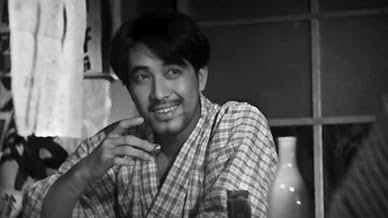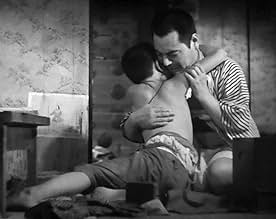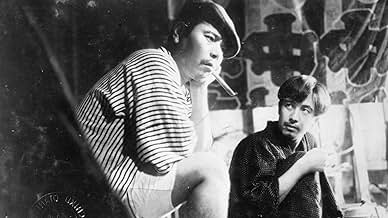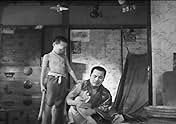CALIFICACIÓN DE IMDb
7.2/10
1.6 k
TU CALIFICACIÓN
Dos compañeros de trabajo de Tokio encuentran a joven que busca un lugar donde vivir.Dos compañeros de trabajo de Tokio encuentran a joven que busca un lugar donde vivir.Dos compañeros de trabajo de Tokio encuentran a joven que busca un lugar donde vivir.
- Dirección
- Guionistas
- Elenco
- Premios
- 1 premio ganado en total
Den Ôhinata
- Jiro
- (as Den Obinata)
Tomio Aoki
- Tomio
- (as Tokkan Kozô)
Chishû Ryû
- Man on boat
- (sin créditos)
Hideo Sugawara
- Boy Taunting Tomio
- (sin créditos)
- Dirección
- Guionistas
- Todo el elenco y el equipo
- Producción, taquilla y más en IMDbPro
Opiniones destacadas
Another early Ozu where family ties - severely tested but affirmed - steer the world away from havoc and into good. Another early Ozu that documents Japanese society being pushed through the wringer of Western influence, cinematically reflected with Chaplinesque beats: the father is a lazy factory worker and no good man-about-town, in stark contrast to the meek, corporate executive father in I Was Born But.., and once more the stubborn son has to live with the shame.
This go round and in comparison to the above film, the intended seduction of suburban life is less effective. The innocence of childhood is less the fulcrum of discovery of how the world works, and more a counterpoint to ordinary drama; thwarted love, strained friendship, high-minded sacrifice in the end that seduces noble, better persons out of everyone.
Everything turns out the way it does for a reason, the film whimsically asserts. Why is sea water salty? But of course for us to salt salmon with.
It is good and was awarded that year with a Kinema Jumpo beating films by future rivals Mizoguchi and Naruse. I assume it won for the denouement of selfless humanity - inspirationally miraculous and accompanied by fireworks in the sky - that must have echoed desirably at tumultuous times such as those, but there were more interesting things afoot in Japanese cinema of the time.
This go round and in comparison to the above film, the intended seduction of suburban life is less effective. The innocence of childhood is less the fulcrum of discovery of how the world works, and more a counterpoint to ordinary drama; thwarted love, strained friendship, high-minded sacrifice in the end that seduces noble, better persons out of everyone.
Everything turns out the way it does for a reason, the film whimsically asserts. Why is sea water salty? But of course for us to salt salmon with.
It is good and was awarded that year with a Kinema Jumpo beating films by future rivals Mizoguchi and Naruse. I assume it won for the denouement of selfless humanity - inspirationally miraculous and accompanied by fireworks in the sky - that must have echoed desirably at tumultuous times such as those, but there were more interesting things afoot in Japanese cinema of the time.
This rarely screened silent gem shows Ozu rather early in his career. It presents the story of a poor factory worker trying to raise his son despite many obstacles and hardships. The biggest obstacle of all is the father himself who, though well intentioned and charismatic, makes one mistake in judgment after another. The father manages to get through all his many trials and tribulations thanks to the support (not always warmly) given by his friends and neighbors.
The most interesting thing for me about Passing Fancy is the way it uses a quite hard boiled, gritty realism and coarsely drawn, boorish characters to elicit very tender feelings in the viewer. The mixture of humor and pathos that advances the plot would be impossible for lesser directors or a weak cast to pull off, but in the hands of this troupe the whole enterprise succeeds wonderfully. Somehow, you may find yourself tempted to cry despite the near-total absence of sentimentality.
The acting is excellent all around, but the young boy deserves special mention. To Japanese, particularly at the time, the boy's behavior must have seemed shockingly inappropriate and unfilial, but his antics and facial expressions are very funny.
It is hard to believe that this is one of three movies that Ozu directed in 1933 alone. If the opportunity arises to see this movie, make every effort to see it.
The most interesting thing for me about Passing Fancy is the way it uses a quite hard boiled, gritty realism and coarsely drawn, boorish characters to elicit very tender feelings in the viewer. The mixture of humor and pathos that advances the plot would be impossible for lesser directors or a weak cast to pull off, but in the hands of this troupe the whole enterprise succeeds wonderfully. Somehow, you may find yourself tempted to cry despite the near-total absence of sentimentality.
The acting is excellent all around, but the young boy deserves special mention. To Japanese, particularly at the time, the boy's behavior must have seemed shockingly inappropriate and unfilial, but his antics and facial expressions are very funny.
It is hard to believe that this is one of three movies that Ozu directed in 1933 alone. If the opportunity arises to see this movie, make every effort to see it.
10kerpan
Dekigokoro (Passing Fancy), is one of Ozu's 3 masterpieces from 1933. It stars the second of cinematic Ozu's "alter egos", Takeshi Sakamoto. Sakamoto typically plays a down and out working class father. Here, he is especially dense, to excellent comic effect. Tomio Aoki (in probably his most significant child role) plays a kid who seems to be considerably brighter than his father -- and who does more to keep the household running. Aoki is (of course) quite funny. But he also does an excellent job of showing a child's response to unwanted change. He and his father have long depended solely on each other -- but now his father has his eye on a young woman who has moved into their slum neighborhood. Aoki very much resents his father's interest in the woman -- and resists her attempts to win his affections.
This is an extremely visual film, with lots of completely "wordless" humor. The film starts out with an extended scene in a music hall (Chishu Ryu performing as the "singer") in which first a lost wallet circulates, and then a flea (or fleas). Probably not as great a family drama as the prior "I Was Born But" or the subsequent "Tokyo Inn", but nonetheless quite enjoyable.
This is an extremely visual film, with lots of completely "wordless" humor. The film starts out with an extended scene in a music hall (Chishu Ryu performing as the "singer") in which first a lost wallet circulates, and then a flea (or fleas). Probably not as great a family drama as the prior "I Was Born But" or the subsequent "Tokyo Inn", but nonetheless quite enjoyable.
Ozu tricked me on this one. I read nothing about it before it started, and as the opening act played out, I thought I was getting a romance. Instead, it ended up being a story about a father and his son, a melodrama that effectively works within its box while peeking out beyond its borders to work quite well. It made me think of Woman of Tokyo, the melodrama that simply went too far in my eyes, and it acted as a contrast to something that kept things sedate enough to work more effectively.
Kihachi (Takeshi Sakamoto) and Jiro (Den Obinata) are coworkers in a brewery. Kihachi is illiterate but has a son, Tomio (Tokkan Kozo), who goes to school. After drinking one night, the two men encounter Harue (Nobuko Fushimi), a young woman in need whom they bring to their drinking spot, run by Otome (Chuoko Iida), who gives Harue a job. The opening of the film is about the dueling affections for Harue with Kihachi bending over backwards to make himself palatable to her while the younger Jiro treats her dismissively. The film actually begins with a quote about geishas being both givers and receivers of temporary affection, something I think could have come from Jiro's perspective. There's this distance because he sees her as just selling herself for temporary room and board. It comes back later as well.
But, Kihachi's efforts get rebuffed, and he's angry about it. Partially taking it out on Tomio, Kihachi, in a conversation with Otome, realizes his error and decides to give Tomio a bit of cash to spend on himself, to make himself feel like a millionaire for an afternoon. And this is where the film finds its focus: on the father and son.
Tomio gets sick with some bad candy, to the point of near death, and Kihachi has to face what he actually cherishes. This section takes up a lot of time in the middle of the film, to the point of being most of the rest of the film, and it's done in that typical Ozu way: quiet and heavily reliant on people looking at each other. Kihachi anguishes over Tomio, exchanging little jokes back and forth when he's conscious, and receiving sympathy and whatever help he can get from those around him, mostly Jiro and Harue.
It's these quiet moments that really make Ozu films. He can fill the openings with light comedy of different stripes, to the point where the opening almost feels like a Lubitsch film, but he's always going to return to what obviously came natural to him: the soft, quiet family drama. And this is where the comparison to Woman of Tokyo becomes the most apt, or contrast, I should say. In the earlier film, it's about a character's death and everyone cries obviously and bigly. Here, Tomio gets close to death, and everyone's sedate and reserved in the face of it. It's the stuff of melodrama (a dying child), but it's treated with so much more tact that it ends up working.
And the finale is about making hard choices in the face of a changing circumstances. Jiro took out a large loan to pay for the doctor, and Jiro is going to go work as a laborer in a remote region to pay it back. Can Kihachi just accept that? Can he accept that his son was saved by someone else?
I would applaud the film more for its ending, but it ends up having its cake and eating it at the same time to the point where I don't get the ending. The emotion of the last hour of the film is clear and effective, but then the ending finds a victory that doesn't quite fit. It limits my enjoyment of the melodrama a bit.
But not enough to undo the rest. I feel like the opening is a bit of a sleight of hand, but it's a good trick on Ozu's part (as well as his writer Tadao Ikeda) to establish characters, setting, and a motif that comes back later, giving greater import to a minor characters' actions. It's quite solid storytelling, combining early comedy with later drama. I just wish the ending more fit the film. But, the character of Kihachi apparently became something of a staple for Shochiku Studios as a recurring character. So, even in the 30s, Japanese cinema wasn't afraid of sequels.
Kihachi (Takeshi Sakamoto) and Jiro (Den Obinata) are coworkers in a brewery. Kihachi is illiterate but has a son, Tomio (Tokkan Kozo), who goes to school. After drinking one night, the two men encounter Harue (Nobuko Fushimi), a young woman in need whom they bring to their drinking spot, run by Otome (Chuoko Iida), who gives Harue a job. The opening of the film is about the dueling affections for Harue with Kihachi bending over backwards to make himself palatable to her while the younger Jiro treats her dismissively. The film actually begins with a quote about geishas being both givers and receivers of temporary affection, something I think could have come from Jiro's perspective. There's this distance because he sees her as just selling herself for temporary room and board. It comes back later as well.
But, Kihachi's efforts get rebuffed, and he's angry about it. Partially taking it out on Tomio, Kihachi, in a conversation with Otome, realizes his error and decides to give Tomio a bit of cash to spend on himself, to make himself feel like a millionaire for an afternoon. And this is where the film finds its focus: on the father and son.
Tomio gets sick with some bad candy, to the point of near death, and Kihachi has to face what he actually cherishes. This section takes up a lot of time in the middle of the film, to the point of being most of the rest of the film, and it's done in that typical Ozu way: quiet and heavily reliant on people looking at each other. Kihachi anguishes over Tomio, exchanging little jokes back and forth when he's conscious, and receiving sympathy and whatever help he can get from those around him, mostly Jiro and Harue.
It's these quiet moments that really make Ozu films. He can fill the openings with light comedy of different stripes, to the point where the opening almost feels like a Lubitsch film, but he's always going to return to what obviously came natural to him: the soft, quiet family drama. And this is where the comparison to Woman of Tokyo becomes the most apt, or contrast, I should say. In the earlier film, it's about a character's death and everyone cries obviously and bigly. Here, Tomio gets close to death, and everyone's sedate and reserved in the face of it. It's the stuff of melodrama (a dying child), but it's treated with so much more tact that it ends up working.
And the finale is about making hard choices in the face of a changing circumstances. Jiro took out a large loan to pay for the doctor, and Jiro is going to go work as a laborer in a remote region to pay it back. Can Kihachi just accept that? Can he accept that his son was saved by someone else?
I would applaud the film more for its ending, but it ends up having its cake and eating it at the same time to the point where I don't get the ending. The emotion of the last hour of the film is clear and effective, but then the ending finds a victory that doesn't quite fit. It limits my enjoyment of the melodrama a bit.
But not enough to undo the rest. I feel like the opening is a bit of a sleight of hand, but it's a good trick on Ozu's part (as well as his writer Tadao Ikeda) to establish characters, setting, and a motif that comes back later, giving greater import to a minor characters' actions. It's quite solid storytelling, combining early comedy with later drama. I just wish the ending more fit the film. But, the character of Kihachi apparently became something of a staple for Shochiku Studios as a recurring character. So, even in the 30s, Japanese cinema wasn't afraid of sequels.
Ozu has often used the theme of father and son relationships in his films and here he explores a little more besides. Beyond the relationship of Kihachi the father and Tomio the young son you get the widower Kihachi trying to become closer to the pretty, much younger Harue. This silent film speaks volumes about family, about hopes but it is Ozu's light comic touch which makes it another great film of his. It is completely silent but it is compelling, actually a story that could be retold and remade in any corner of the globe. The acting is just about universally good and the film has a lot of heart attached to its sometimes ordinary theme. Then again, Ozu has always made extraordinary out of the ordinary. Here is another example of the master at work.
¿Sabías que…?
- TriviaYasujirô Ozu regular Chishû Ryû has a small role towards the end of the film as a fellow passenger on board a ship, playing an uncredited "Man on Boat".
- ErroresKihachi states that 50 sen to a boy his age (referring to Tomio) is like 10 ryo to him and Otome. The ryo was replaced by the yen in 1871, over 60 years earlier. (The yen replaced the ryo at par; there are 100 sen to the yen.)
However, Otome then says, "No, more like 1,000 yen!" So, it's possible "ryo" was still being used synonymously with "yen" over a half-century later.
- ConexionesFeatured in Transcendental Style and Flatulence (2017)
Selecciones populares
Inicia sesión para calificar y agrega a la lista de videos para obtener recomendaciones personalizadas
Detalles
- Tiempo de ejecución1 hora 40 minutos
- Color
- Mezcla de sonido
- Relación de aspecto
- 1.37 : 1
Contribuir a esta página
Sugiere una edición o agrega el contenido que falta

